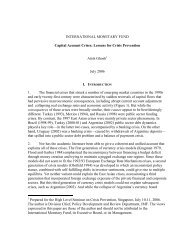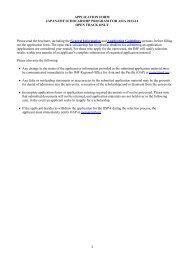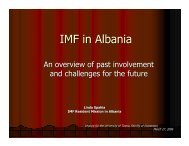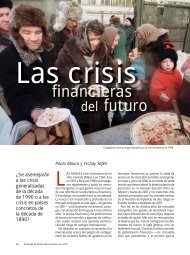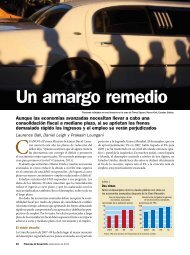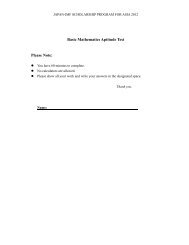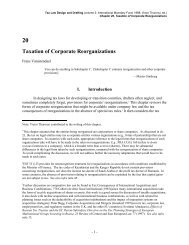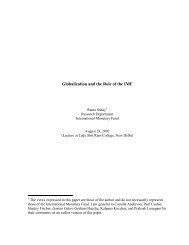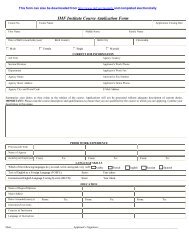Insolvency â why a special regime for banks? by Eva Hupkes ... - IMF
Insolvency â why a special regime for banks? by Eva Hupkes ... - IMF
Insolvency â why a special regime for banks? by Eva Hupkes ... - IMF
Create successful ePaper yourself
Turn your PDF publications into a flip-book with our unique Google optimized e-Paper software.
agency had existed since 1863 in the <strong>for</strong>m of the Office of the Comptroller of the Currency<br />
(OCC). The Banking Act of 1933 created a new agency with supervisory powers, the Federal<br />
Deposit Insurance Corporation (FDIC). In other countries, such as Italy and the Netherlands,<br />
<strong>special</strong> banking legislation was adopted but the supervisory responsibilities remained with the<br />
central bank. 5 In the United Kingdom, beginning in 1935, the Bank of England stepped up its<br />
in<strong>for</strong>mal supervision of the main merchant <strong>banks</strong> (although it was not until 1979 that laws<br />
were enacted which gave statutory backing to this function on the part of the Bank of<br />
England).<br />
Since the 1930’s, the responsibilities of bank supervisors have been expanding continuously,<br />
often, however, in a reactive mode. 6 Technological developments, product innovation,<br />
globalization and structural changes have brought about further regulatory demands, including<br />
the protection of customers against improper business conduct and the protection of society at<br />
large against money laundering and associated criminal activities.<br />
Can the same arguments that led initially to the introduction of an ex ante <strong>regime</strong> to prevent<br />
bank failures, that is a <strong>special</strong> entry <strong>regime</strong> and prudential regulation, also be mustered in<br />
favor of a <strong>special</strong> <strong>regime</strong> <strong>for</strong> dealing with insolvent <strong>banks</strong> through reorganization or<br />
liquidation? This article will review some of the common arguments put <strong>for</strong>ward <strong>for</strong> and<br />
against a <strong>special</strong> bank insolvency <strong>regime</strong>. It will also discuss the features that distinguish bank<br />
insolvency rules from general insolvency rules. Finally, it will consider the areas in which<br />
<strong>special</strong> rules appear most necessary.<br />
The debate – a <strong>special</strong> <strong>regime</strong> <strong>for</strong> insolvent <strong>banks</strong>?<br />
Why should <strong>banks</strong> be accorded <strong>special</strong> treatment in insolvency? The common answer is that<br />
<strong>banks</strong> play a <strong>special</strong> role in a country‘s economy, 7 in that, collectively, their functions are so<br />
2002, the new financial services authority (BAFin “Bundesanstalt für<br />
Finanzdienstleistungsaufsicht“), created <strong>by</strong> a new law on a single financial services authority,<br />
started operating.<br />
5 The Bank of Italy acquired supervisory functions in 1936. In the Netherlands, the Dutch Act<br />
on the Supervision of Credit Systems, which was first adopted in 1952, <strong>for</strong>malized the<br />
supervisory tasks of De Nederlandsche Bank.<br />
6 For instance, following the collapse of the German Herstatt Bank in 1974, the Basel<br />
Committee on Banking Supervision was established. In 1975, the Basel Committee adopted<br />
the Basel Concordat, which was revised in 1983, following another bank failure the effects of<br />
which were felt in many jurisdictions, that of Banco Ambrosiano. The Basel Committee’s<br />
Minimum standards <strong>for</strong> the supervision of international banking groups and their cross-border<br />
establishments of July 1992, and the European Council Directive 92/30/EEC of 6 April 1992<br />
on the supervision of credit institutions on a consolidated basis were adopted following the<br />
BCCI failure.<br />
7 See, e.g., Edward W. Kelley Jr., Are Banks still <strong>special</strong>?, in Banking Soundness and<br />
Monetary Policy 263 (Charles Enoch, John H. Green, eds. 1997); E. Gerald Corrigan, Are<br />
Banks <strong>special</strong>?, in Federal Reserve Bank of Minneapolis Annual Report 1982, 5-7 (1982),<br />
also available via the Internet at http://minneapolisfed.org/pubs/ar/ar1982a.html.<br />
2





